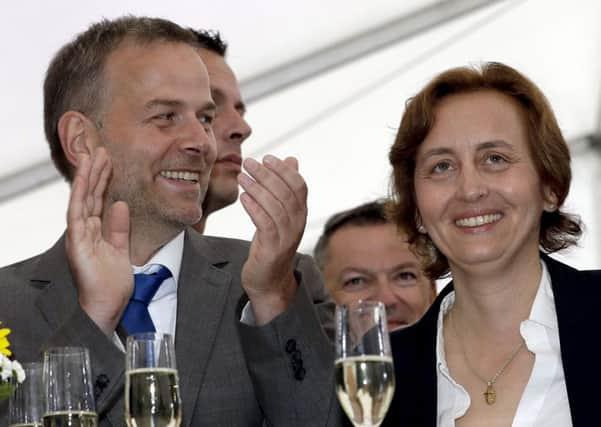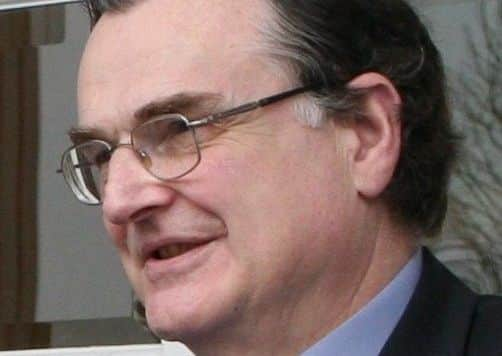Ian Ellis: Rank populism sets people more deeply against one another and erodes trust between them


Perhaps a good place to start is the definition of the term in the Oxford Dictionary: “A political approach that strives to appeal to ordinary people who feel that their concerns are disregarded by established elite groups.”
While true as far as this definition goes, it only goes so far.
Advertisement
Hide AdAdvertisement
Hide AdBecause the populist tends to gain support through appealing primarily to people’s feelings, it can become far from benign. Emotions are not clearly thought out opinions.


At one level, by giving the people a voice and power through democratic processes, populism can be seen as essentially democratic but what it at heart at least seems to do, as well as setting parties squarely against each other in parliament, is to set ordinary people against one another.
A further distinctive downside is that, because of its majoritarian emphasis, minority concerns and rights can be sidelined and, in the process, minority groups can be misrepresented through the oversimplification of issues, or can even be demonised.
Democracy is not crude majoritarianism but requires that rights of minorities are respected. It should not become a ‘heavy hand’ nor should it ever lead to mob rule.
Advertisement
Hide AdAdvertisement
Hide AdThere is a populist spectrum, both from left to right and in terms of intensity or extremes. Yet, oratory is an art and can be employed to great good as well as to a much lesser good, even an evil.
Populism can be the precursor of authoritarian regimes or it can, more helpfully, provide a useful corrective as elites assume too much influence and power in governance.
However, what really makes populism rightly suspect is that, while arguments are presented, it tends to play more on instinct than rely on dialogue. Instincts are not always right and can, in fact, be very wrong.
Populism is also associated with nationalism or, rather, an over-the-top patriotism. It is good to love one’s homeland but love for country can easily descend into disdain for other nations.
Advertisement
Hide AdAdvertisement
Hide AdIn the church, it is often said that God’s kingdom must be one’s first allegiance. It ranks before any earthly nation or power. It is a kingdom with no borders except between good and evil, a kingdom of the heart. It is ‘within’ us and, even for a non-believer, is surely a great and energizing concept.
Rank populism, through its tendency to set people more deeply against one another, creates suspicion of those with different views to one’s own and therefore erodes trust.
How do people come to trust each other? Does it take long, or can it be more swift?
Recently I had the privilege of representing the Church of Ireland at a five-day German church festival of faith, known as a Kirchentag, held in Dortmund.
Advertisement
Hide AdAdvertisement
Hide AdThe theme was ‘trust’ and one of the speakers was German Chancellor Angela Merkel.
When asked the question about how quickly she found she could establish trust with fellow politicians both at home and on the world stage, she answered, as the consummate politician she surely is, that sometimes it was quickly established but sometimes took rather longer.
Then followed the question: ‘Do you trust Donald Trump’? Again, the reply was careful. Yes, she said, but added that she also spoke her mind freely to him.
It is surely true. Sometimes trust in others comes more easily than at others, but it is essential in life and, while crime sadly still abounds, trust is a foundation stone of society, in particular in family, business and professional life, politics and, of course, religion.
Advertisement
Hide AdAdvertisement
Hide AdIn terms of the current impasse at Stormont and the difficulties over Brexit, there is surely room for more trust in political life. Certainly, the inability of politicians in Northern Ireland so far to get the Assembly and Executive up and running again has not only meant that important decisions affecting ordinary people have had to be put on hold, with all the adverse consequences of that, but the whole situation also portrays Northern Ireland to the wider world in a most undignified light. It spells instability, which can only serve to put off inward investment.
Church leaders, it should be noted, have been active in trying to help things forward.
It was out of a shared pastoral concern about what they described as “the acute political and social crisis arising from the prolonged absence of the devolved institutions”, that back in September of last year the Church of Ireland and Roman Catholic Archbishops of Armagh, the Presbyterian Moderator, the Methodist President and the President of the Irish Council of Churches, jointly brought together leaders of the five largest political parties in Northern Ireland for a dialogue.
Subsequently, with support from the Community Relations Council, they facilitated a process of four regional meetings in various parts of Northern Ireland, bringing together MLAs, representatives of local churches, and representatives from various sectors of civic society, to discuss the current situation.
Advertisement
Hide AdAdvertisement
Hide AdThe civic society sectors included education, health and social care, policing, business, farming and agriculture, youth work, family support, women’s groups, anti-poverty work and community development.
Referring to the effects of the Stormont impasse, the church leaders said that in churches and faith-based charities they were seeing every day “the damaging impact of this uncertainty” and they expressed particular concern that, in the context of Brexit, the consequences of the “political vacuum” had not been receiving sufficient attention.
They called for courageous leadership, not least in combatting sectarianism which they said “remains a pervasive problem”, and they observed that a breakdown of trust lay at the heart of our current difficulties.
While trust has to be exercised with one’s eyes wide open, it is not, as Mrs Merkel also said at the Dortmund meeting I attended, necessarily naïve to trust.
Advertisement
Hide AdAdvertisement
Hide AdTrust has also been shown to be capable of producing results.
The German Chancellor remarked that Europe had suffered hundreds of years of wars but that citizens had been prepared to trust one another in order to make peace.
She said that European and transatlantic partnerships had only been possible because of shared values and trust.
She also said that if, after the Second World War, the Allies had not trusted the German people, reconciliation and a brighter new future for us all would not have been possible.
Advertisement
Hide AdAdvertisement
Hide AdSuch comments do put Northern Ireland’s political divisions into some perspective and challenge our political leaders to take brave steps of trust towards one another, as they did in the run up to the 1998 Belfast Agreement, in the interests of what the church leaders have aptly called “the common good”.
Populism in Germany has given rise to the right/far right political party known as Alternative for Germany (AfD). At the Dortmund meeting, representatives from all the parties in the German parliament were invited, except for the AfD.
In some ways, that seemed to deny the central theme of the meeting, trust. For that reason I asked a number of insiders what they thought of the decision and the response was mixed.
Some thought the AfD should have been invited even if only to allow them to be challenged, while others agreed with the decision to exclude the party as the AfD’s policies went beyond what was acceptable.
Advertisement
Hide AdAdvertisement
Hide AdI have no doubt that the organisers of the event gave very serious thought to the issue and that they were wary of giving any credibility to extremism.
It shows that populism can bring about its own dilemmas which require sound judgement as well as the readiness to trust others when there is sufficient ground to do so.
• Canon Ian Ellis is a former editor of The Church of Ireland Gazette.